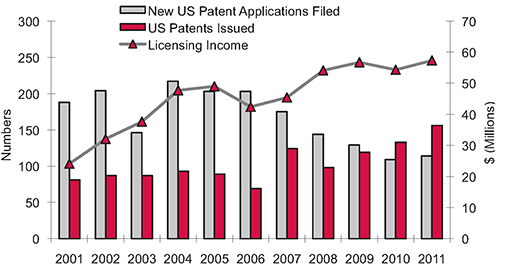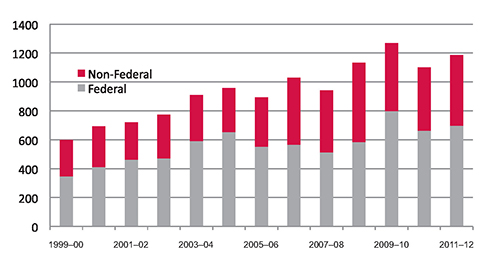Fourth-Year Progress Report
Invest in scholarly domains in which we have existing or potential strength and impact
- Continuing research in human development, developmental disabilities and neurodegenerative diseases, the Waisman Center — one of only 15 U.S. centers of its kind — is celebrating its 40th anniversary.
- Working with a UW computer scientist, educational psychologist researchers are using computers to scour Twitter for posts that mention bullying events, offering new insights that could lead to more effective prevention methods.
- In a study of online behavior, life sciences communication researchers found that sharing science-related information via the Internet can have unintended consequences: public discourse on science topics may be narrowing due to comments from readers and other feedback that can color opinions.
- UW–Madison was part of a major collaboration at CERN laboratories in Switzerland that led to the discovery of the Higgs boson, which is thought to be responsible for imparting mass to matter, opening the door to a new era of understanding the origins of mass.
- The Center for Investigating Healthy Minds began a pioneering research study into the effectiveness of programs to help veterans adjust to life after combat, hoping to develop a model of care for those with post-traumatic stress disorder.
- More than 4,000 students and their families will be better prepared for success in school, thanks to $15 million of federal funding to improve low-performing schools in disadvantaged communities, an expansion of an initiative first developed by the Wisconsin Center for Education Research.
- Researchers at the School of Medicine and Public Health are moving closer to a significant milepost in the battle against Alzheimer’s disease by using an advanced form of MRI to establish the first signs of decline in the brain.
With more than $1.1 billion in research expenditures — the money an institution expends in pursuit of science, engineering and other scholarly activity — for fiscal year 2011, UW–Madison ranked fourth among all U.S. research universities.
A proposal to create a College of the Arts was developed with the intention of bringing more visibility to the arts and arts education on campus, helping to attract top students and faculty to UW–Madison and, thereby, helping to build our reputation as leaders in arts education throughout the UW System, the nation and the world. The proposal, currently being evaluated, builds on strengths of interdisciplinary practice and performance, as well as research and history in the arts.
A new home for the School of Human Ecology, Nancy Nicolas Hall, opened for fall, providing 200,000 square feet of space. Named after alumna Nancy Johnson Nicolas, the facility is the first exclusive-use academic building on campus named in honor of a woman. A 100 Women Wall of Honor recognizes those who have embodied the school’s mission to improve the quality of human life.
The Andrew W. Mellon Foundation awarded the Center for the Humanities a $1.1 million grant to develop career opportunities beyond academia for humanities doctoral students. Initiatives will include humanities graduate fellowships, the UW’s first-ever graduate certificate in public humanities and assistance for humanities faculty to reach new audiences.
With the support of a National Science Foundation grant, UW–Madison will train a new generation of scientists to explore conservation science within the context of major issues such as climate change. The grant will allow doctoral students to collaborate with researchers outside their home disciplines.
Each year, faculty and staff conduct and share an astounding array of research projects that inform the lives of citizens in the state, the nation and the world. For example:
Supporting charts
Note: If you are unable to read the charts below, please contact the Office of Quality Improvement. Staff there will help explain the content of any chart in this progress report.
Technology Transfer

Extramural Awards by Source (Millions of Dollars)
